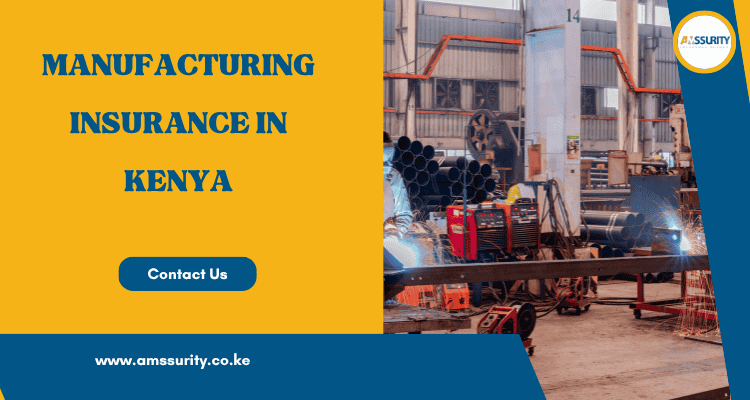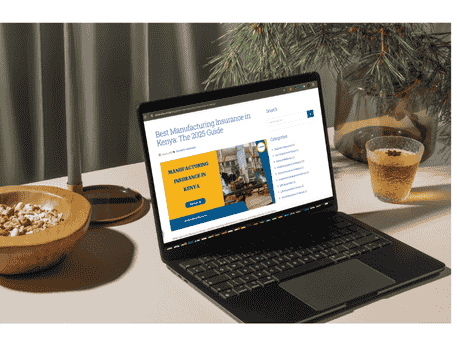Best Manufacturing Insurance in Kenya: The 2025 Guide

When you run a factory in Kenya, whether roasting coffee beans in Thika or stitching uniforms in Athi River, you live with a quiet worry that one bad day could shut the whole place down. A burst pipe can soak finished stock, a power surge can fry a million-shilling machine, or a recalled batch can send customers packing. Manufacturing insurance in Kenya exists to make those bad days survivable: it helps cover repairs, replaces lost income, and lets you focus on getting the line moving again instead of scrambling for cash. With the rise of the manufacturing sector, manufacturing insurance in Kenya has become essential for businesses aiming to thrive in a competitive environment.
Table of Contents
Kenya’s Manufacturing Snapshot
Manufacturing is making a comeback from pandemic-era slowdowns but still contributes only 7.6% of national GDP, down from 11.08% in 2011, according to the Kenya Association of Manufacturers’ 2025 Priority Agenda.
Recent quarterly data show a 1.3 % real growth in Q1 2024, while gross value added rose to KES 228.9 billion in Q4 2024.
The importance of manufacturing insurance in Kenya cannot be overstated, as it plays a crucial role in safeguarding businesses from unforeseen events that could impact production and profitability.
Top sub-sectors driving the numbers in the manufacturing sector
- Food & beverage processors (tea, sugar, edible oils)
- Building materials (cement, steel, paints)
- Textiles & leather
- Pharmaceutical & FMCG packaging
- Automotive assembly & fabricated metals
With the government’s Manufacturing 20BY30 vision, raising the sector to 20 % of GDP by 2030, insurers expect a wave of plant expansions, robotics upgrades and export-grade quality controls.
Why Manufacturers Need Tailored Insurance
Below are some examples of risks that manufacturers in Kenya might face:
- High-value machinery risk- A single turbine or CNC line worth KES 50 M+ can cripple production if a bearing fails.
- Fire & explosion hazards- Paint, solvents, compressed gas and dust make factories ignition-prone.
- Supply-chain volatility- Delays at Mombasa or power outages can choke cash flow in days, not weeks.
- Third-party liability- Defective goods, workplace injuries and environmental spills attract big claims and regulatory fines.
- Cyber & automation exposures- IoT-linked production lines raise ransomware and data-privacy stakes.
Core Insurance Policies for Kenyan Manufacturers
Understanding manufacturing insurance in Kenya is vital for business owners, as it provides financial security and peace of mind to navigate challenges.
For manufacturers in Kenya, tailored manufacturing insurance in Kenya policies can address specific risks and needs, ensuring comprehensive coverage.
| Policy | What it Covers | Why It Matters |
|---|---|---|
| Industrial All Risks (IAR) | Fire, flood, theft, accidental damage to buildings, plant, stock & finished goods in one broad product | One slip-in-grease fire can torch the whole plant; IAR wraps multiple perils into a single policy |
| Business Interruption (BI) | Gross profit, standing charges and extra expenses during downtime after an insured peril | Without BI, even a short shutdown can erode market share and loans |
| Machinery Breakdown (MB) | Sudden, unforeseen mechanical or electrical failure including operator error of named machines | Critical for imported gear with long lead times on spares |
| Product Liability & Recall | Injury or property damage arising from defective products; recall costs | Mandatory for exporters; protects brand reputation at home and in EAC/COMESA markets and also for specific industries |
| WIBA / Group Personal Accident | Covers employees for injuries or death while on duty as mandated by law | Compliance + talent retention in a competitive labour pool |
| Goods in Transit & Marine Cargo | Loss or damage to raw materials and finished products en-route (road, rail, sea, air) | Inputs & finished products often travel 500 km+ from the port or region to plant & GIT keeps the balance sheet stable |
| Fidelity Guarantee | Theft of cash, stock or finished goods by employees or agents | Curb insider losses in warehouse, accounts and procurement |
| Cyber & Data Liability | Breach response, ransomware payments, system-failure losses | PLC-controlled lines and ERP systems are prime targets |
| Environmental Liability & Public Liability | Clean-up costs, third-party injury/property claims from pollution events | Rising NEMA enforcement on effluent, stack emissions & hazardous waste |
Engaging with insurance experts can clarify the complexities surrounding manufacturing insurance in Kenya and assist in customising policies to fit specific needs.
Investing in the right manufacturing insurance in Kenya is crucial for protecting your manufacturing business against potential risks and ensuring long-term growth.
Specialised Endorsements & Add-Ons
Sometimes, manufacturing insurance in Kenya might have some extras that you can buy into your existing policy. Some of the additional add-ons include:
- Deterioration of Stock – ideal for food processors with cold-chain dependence.
- Contract Works / Machinery Installation Cover – protects during plant upgrades.
- Supplier’s Extension – claims trigger if a named key supplier suffers a loss.
- Public Utilities Extension – covers BI losses from KPLC or water supply outages.
- Debris Removal & Pollution Clean-up – higher limits for chemical or plastics plants.
Investing in manufacturing insurance in Kenya helps to protect your business assets and ensures continuity in production during adverse situations.
Many firms overlook the importance of manufacturing insurance in Kenya, which can be a costly mistake in times of crisis.
Regulatory & Compliance Essentials
The manufacturing insurance in Kenya program is not complete if you are not compliant with regulations. Some important notes to remember that are not optional are:
- Workers Injury Benefits Act (WIBA): This is mandatory for every employer; by ignoring it the manufacturer might lead to potential fines and closure orders.
- KEBS standardisation marks and product licences: Insurers may void liability claims if goods lacked proper certification at the time of loss.
- NEMA permits: Proof of valid licences for effluent discharge and air-quality emissions can lead to reduction premiums.
- Occupational Safety & Health Act (OSHA) audits: Good scores can result in lowering of the deductibles/excesses and “preferred risk” status with underwriters.
What Determines Your Premium?
In addition to basic coverage, manufacturing insurance in Kenya often includes specialised endorsements that cater to unique business needs.
Understanding how different factors influence manufacturing insurance premiums in Kenya can help businesses make informed decisions.
When it comes to the overall pricing and determining the cost of manufacturing insurance in Kenya, below are some of the considerations:
- Sum insured & turnover- Higher asset values and revenues push up the base rate.
- Fire-protection grade – Sprinklers, hydrants, automatic gas suppression and 24-hour security scan reduce your premiums significantly
- Claims history- Three years’ clean claims record? Negotiate a 5 – 10 % no-claim discount.
- Risk-management culture- Certified ISO 45001/14001 plants can enjoy preferential manufacturing insurance terms.
- Location & construction- Non-combustible walls/roof and distance from informal settlements improve underwriting outcomes.
How to Speed Up Claims & Stay in Production.
The heart of insurance is in the claims process. When it comes to the manufacturing insurance in Kenya claims process, the manufacturer needs to:
- Keep digital copies of purchase invoices, maintenance logs and serial numbers in the cloud.
- Maintain a 24-hour incident hotline, insurers must be notified “immediately” or within 7 days for business interruption triggers. This is also subject to the excess taken by the manufacturer.
- Photograph damage before clean-up; secure CCTV footage.
- Appoint an internal loss-task force (finance, production, safety, legal) with clear authority to liaise with assessors.
- Review the sum insured vs. replacement cost annually to avoid under-insurance penalties.
Having a robust claims management strategy is essential for businesses utilising manufacturing insurance in Kenya, ensuring swift recovery from incidents.
Learning to go through the claims process effectively can be the difference between smooth operations and significant losses for Kenyan manufacturers relying on manufacturing insurance in Kenya.
Frequently Asked Questions
Is Industrial All Risk mandatory in Kenya?
No. Only WIBA/workers’ compensation is compulsory, but lenders and ISO clients often contractually require Industrial All Risk and Business Interruption.
How long should I set the indemnity period on Business Interruption cover?
Most Kenyan manufacturers select 12 months, but plants with imported machinery or niche raw materials may need 18 – 24 months to restore full throughput.
Does Product Liability cover exports to the EU or the US?
Yes, if your policy includes worldwide jurisdiction. Always check territorial limits and the retroactive date.
Can SMEs afford manufacturing cover?
Micro-plants can start with a KES 5 m Industrial All Risk limit and add Machinery Breakdown on the two most valuable machines for as little as KES 60,000 per year, depending on the hazard class.
Ready to Safeguard Your Production Line?
Book a free 30-minute plant-risk review with Amssurity’s manufacturing team. We’ll walk your floor, spot the weak points, and send you a clear, no-obligation quote within 24 hours—so you can keep the machines running and the orders flowing.

